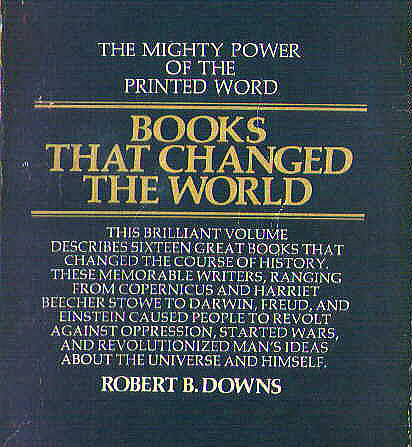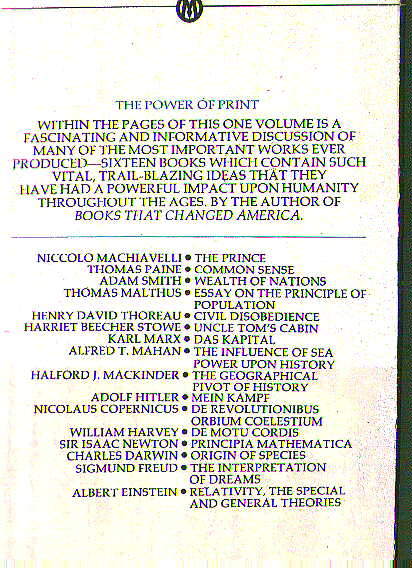
by Dr. Robert B. Downs (1956 )
Mentor edition published by The New American Library of
World Literature, Inc.
Many feel that by retaining British laws we will be able to
make India similar to Britain at least. Yes we will - to
Britain of the 18th and 19th century. Not the present one which
( like most of the Western World ) is in a perpetual state of
evolution. What follows is from the great book shown at right.
These give some idea of the influences which shaped India at
the time of its colonisation. We are under no compulsion to
retain those elements.
1775 - That is one year before the US war of Independence. Around Clive's time - Battle of Plassey . The East India company discovered its munitions superiority, and included fake governance in its repertoire. To read a 44 page discourse about Clive click here.
"However, Paine brought with him an invaluable asset of another kind----his background of experience. He had observed the primitive brutality with which justice was administered in England, he had known abject poverty, he had heard and read much about man's natural rights, he had seen the vast chasm, separating the millions of ordinary folk from the few thousand members of the royalty and nobility in Britain, and he knew the rotten-borough scheme of choosing the Houseof Commons, and of the corruption and stupidity of the royalfamily. Having thought deeply on these matters, Paine was possesed with a profound compassion for humanity, a love of democracy, and an urge for universal social and political reform."
The above is from a chapter in the book about COMMON SENSE - by Thomas Paine. Click here to read this short text Paine provided the ideas for the US Declaration of Independence . Benjamin Franklin and Thomas Jefferson merely provided the overview, and the actual clerical work. This Pamphlet was the seed for the most remarkable act of the last millenium , the construction of an entire system of Governance almost from a scratch. All the others are indebted to enormous inheritances.
Around 1870's
( The end of the Company's tenure, nothing really changed except the crown officially took responsibility. Hence it could not openly continue its profitable Opium growing and selling wing. Also there was too much competition from independent 'traders'.)
"In Marx's Day England was the prime exhibit of the working of the capitalist system. Examples to illustrate his (Marx's)economic theories were accordingly drawn almost entirely from that country. Horrible instances were plentiful, for the institution of capitalism in the midvictorian period was at its worst. Social conditions in factory communities were indescribably bad. Basing his findings upon official reports of government inspectors , Marx presented the facts accurately in CAPITAL to use the English title. Women pulled canal boats along the towpath with ropes over their shoulders. Women were harnessed like beasts of burden, to cars pulling coal out of British mines. Children began to work in the textile mills when they were nine or ten years old, and labored twelve to fifteen hours a day. As the practice of night shifts came into vogue the beds in which the children slept were said never to get cold, for they were used in shifts. Tuberculosis age and occupational diseases killed them off at a high rate."
The above is from the Chapter about DAS KAPITAL completed about 1870.
" The year 1776 may logically be regarded as the close of one epoch and the beginning of another. The American Revolution had started, the French Revolution was brewing, and the industrial Revolution, sparked by the discovery of steam power, was gathering speed. One commentator has char acterized the preceding era as "the dark ages of modern time." In England virtually every aspect of economic life was under strict governmental control. Prices were stabilized, wages and hours of labor fixed, production regulated, and foreign trade, both imports and exports, completely dominated by the state. War was almost always present. National policy dictated a strong army and navy, a large population, grabbing of colonies throughout the world, and weakening, by fair means or foul, of rival countries, such as France. Any suggestion of an equitable distribution of wealth was violently opposed by the ruling classes. Education was reserved for the privileged few criminal laws were extremely severe, and political rights for the masses existed largely in theory rather than in practice. As it had done for generations, the landed aristocracy still held the reins of government; but a new and powerful class of merchants and industrialists had risen, demanding and receiving special privileges for themselves. In the view of this group, exports were blessings, imports calamities; money should not be permitted to leave the country; a "favorable" balance of trade should always be maintained; wages for for labour should be low and hours long; high tariffs must protect home industries; a strong merchant marine was essential; and any measures which aided the mercantilists ipso facto were assumed to benefit the nation as a whole. Under highly vocal pressure, Parliament had enacted most of these concepts into law."
The preceding is from the chapter about Wealth of nations by Adam Smith

Gandhiji...
"Even the most despotic government," said Gandhi,"cannot stand except for the consent of the governed which consent is often forcibly procured by the despot. Immediately the subject ceases to fear the despotic force, his power is gone."
It was a reaction to Britain's Tyrannical system that
started two great movements of the last millenium the US and
Communism . Even Britain improved over the years, but as the
system even in its primitive state seemed superior to what we
had, we retained it with a vengeance. Now we are a zoo in the
community of nations.
Does it make sense to rake up all this now ? Yes because even today in India these laws are being used to arrest development and the energy of a seething nation. Whatever happened to the use of conscience and good judgement which even these laws allow in their implementation.
Back